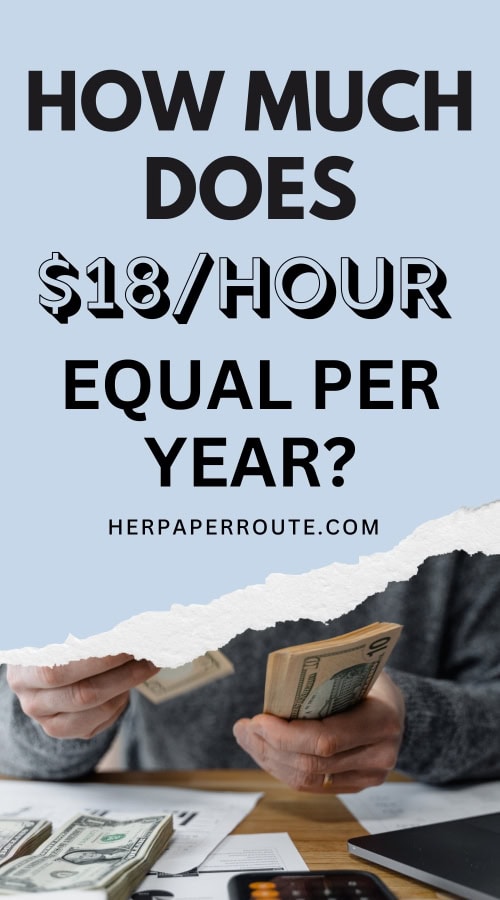How Much Does $18 an Hour Equal Per Year? Can You Live Off It?

Wages for jobs are a complex subject for many. It’s hard to know how much is a good amount for a salary or a good starting amount.
This applies especially if you are just starting out in the workforce or are beginning a new career. 18 dollars an hour may sound like a lot of money or a little, depending on where you live and the amount you are used to making.
As an affiliate partner of various brands and sponsored content, HerPaperRoute may earn commission on qualifying purchases. Disclaimer
At first glance, it might seem like a reasonable wage. But is it really? How much is $18 an hour in a year?
And what are the other factors to consider? Check out how much money this equals per year, plus additional thoughts on taxes and living wages.
How Much is $18 an Hour in a Week?
Many jobs pay monthly or bi-weekly, but it’s also possible that you will receive a paycheck each week for your work. Generally, workweek hours are based on a 40-hour schedule.
Considering this number, 18 dollars an hour for a 40 hour week would equal $720 a week before taxes. This means that if you get paid twice a month, you will make $1440 per paycheck working 40 hour weeks.
This is a decent wage for many, but let’s find out more about how much 18 an hour can really buy you.
How Much is $18 an Hour in a Month?
This is what most people base their questions about pay from – monthly paychecks. How much is $18 an hour for an entire month?
Based on a regular 40-hour workweek, let’s do the math. $18 an hour if you work a 40 hour week and 52 weeks a year, dividing by 12 equals $3120 per month before taxes.
This should give you a good idea of the amount you’d be making with this hourly rate and how that applies in everyday life.
Related: How to Calculate Gross Monthly Income (with Examples)
Convert $18 Per Hour to Yearly Salary
So, how much does $18 per hour equal out to per year, anyway? Assuming you are working a full-time job with a 40 hour work week, I’ll do the math.
$18 an hour x 40 hours per week x 52 weeks a year equals $37,440 before taxes. So, before any money goes towards taxes, retirement, healthcare, or anything else, this is what you’d have.
What is $18 an hour annually after taxes?
Knowing the gross amount is good, but since you don’t actually see all of that money in your paycheck, maybe you want a more practical number. How much is $18 an hour annually after taxes?
A question like this is hard to answer because it’s very subjective. It depends on your tax situation.
It also depends on if this is your only job, if you have more than one, or if you are married and including a spouse’s income. All of these things can change your taxes.
Start by deducting at least 15% for taxes to get an idea. But, for most people, your taxes will be based more on where you live and your personal tax situation. But 15% can help you get an idea of how much money you’ll see.
After a 15% tax reduction, you’ll end up with $31,824 annually. This breaks down to approximately $2,652 a month when divided by 12 for a monthly amount. Now let’s discuss the other questions about this amount.
What Salary Equals $18 an Hour?
Not every job pays by the hour. Some people work on salary, meaning they are paid the same regardless of hours.
This can be a favorable situation if the working hours are reasonable. Still, it can also become less pay for more work if you aren’t careful.
If you are offered a salary position of $37,440 a year, that equals $18 an hour.
Sometimes amounts can sound like a lot more when the entire yearly figure is given, but before accepting a salary position, always break it down by the average number of hours you’d work in a week or month to see if it’s reasonable.
Is $18 an Hour Good Money?
There is not just one answer because it depends on many other factors. $18 an hour is not really a lot of money, no. But it is above the poverty level.
You would not be considered poor with this salary, but neither would you have a lot of extra cash. It is above minimum wage.
This may be a good starting amount of money for someone who is just out of school or is starting an entry-level job because it is higher than the standard minimum amount you can be paid for a job.
$18 an hour is not considered a living wage in all states. It could be challenging to live off this amount without any extra coming in. But just because it is above the poverty level and higher than minimum wage doesn’t mean it’s good money.
Should You Take a Job for this Amount?
There are a few questions to consider before accepting a job like this. You don’t want to take this on without thinking it through. Here are the things to consider before beginning with this salary.
Do you have another income or side hustle?
You may be able to pay your bills with this salary, but it also depends on where you live. If you live somewhere relatively cheap with reasonable rent prices, you may be able to make it.
But if you want to have any extra money, you should decide if you’ll have a side hustle or another job. After all, not all locations cost the same.
If your partner or spouse has a job and you combine finances, you may be able to make this work, as well. And if you have a side hustle or income, you will have some extra money for saving and spending, which should make it easier to accept a job like this.
Starting a side hustle just to earn extra is an innovative and safe thing to do for your money. Try out a side hustle that you can do on the weekends or at night, or even just a few times a year, like house sitting.
Anything that can bring in an extra income will be helpful. And having another income may give you the option to accept a job that is an excellent opportunity, even if the pay isn’t perfect to begin with.
Is this your first job?
A job that pays $18 an hour can be a good amount depending on your experience level. If this job will be your first one, or you are right out of college, $18 an hour isn’t a bad starting salary.
If the position is entry-level and you are new to the work, you may be able to accept this amount and work your way up to pay raises and promotions.
And usually, you can’t expect to make great money with your first job. It’s more about work experience.
But here’s some advice: don’t stay at this pay rate for too long. After working for a year or so, you should be asking about a raise or looking around for something that pays a bit better if more money isn’t possible.
What else does it offer – benefits or networking opportunities?
Are there other things besides the salary that make the job attractive? For example, is the work in your chosen field and will give you the experience you need?
Maybe working for a year in this company will provide you with better opportunities for jobs later on in your life.
Perhaps benefits are offered along with it, or you have a chance to network with people in your chosen industry. If this is the case, the added perks may be enough to accept the job.
Insurance can be costly if you pay for it on your own, but if your job offers to help out, this can be a massive motivator for working there. And being around the right people in your chosen industry is likely to help you out later when you want to advance in your career.
You will probably learn a lot from being around other professionals that are working a job that you one day want to have. Ask them questions and try to learn and gain more experience by networking.
What are your expenses?
Another question is whether you can afford to work this job. If the salary doesn’t cover your bills, you may need to reevaluate whether or not it’s worth it. List all of your bills and expenses and make sure they are less than the amount you make after taxes before accepting a job for this amount.
If your expenses are less than the salary, you can probably do this. Still, if you have a better job offer or the amount won’t cover your bills, I wouldn’t consider working for this salary.
How to Budget With This Income
Budgeting will help you keep your money under control, and there are a few things you should remember when creating a spending plan. Check out these ideas before taking the job.
Expenses and non-negotiables first
When budgeting, first list out all your expenses and non-negotiable costs. Include everything, even the things that aren’t due every month, such as insurance or health bills. Once you know how much your expenses cost, you can move forward.
Savings and retirement
See if there is any money left over after expenses with this salary. Ideally, if you accept this amount, you should still have money left after you pay your bills to save some and put away a little for retirement.
This might be a hundred or a few hundred, but try to save as much as possible. You may also contribute to your 401k through your job if this is offered.
It’s an easy way to save for retirement, and some employers offer an employee match, which is money that you can use when you retire that you don’t have to pay back – it’s just extra. Make sure to take advantage of this if you have the option.
Small amount of fun money
Everyone needs a little bit of coffee money and some cash if you find something you want to buy. If there’s something significant you want to purchase, consider making a savings fund for it, but if it’s just money for small, fun things, try to set aside a little bit each week, maybe $10 or $20.00.
Make sure to not get too crazy with the spending money, though, because this salary is not very high. The chances of covering large unnecessary costs are not good, so make sure to keep all spending under control and planned by your budget in advance.
Reduce expenses and costs
See what you can do to reduce costs without affecting your lifestyle too much. If possible, try to lower your expenses since $18 an hour isn’t a lot for most lifestyles.
If you’re paying for anything, like un-used streaming services on TV or subscriptions, cancel them to save. Also, see if you can use coupons and shop at a cheaper grocery store, reduce your electricity bill, lower internet costs, etc.
Take an evaluation of your budget, and ask yourself where you can cut back without noticing a lot. Remember that some things just cost what they cost, like rent, while others, like groceries and gas for your car, are variable, and you may be able to save a little bit.
It is possible for an individual to live off of $18 an hour if they have minimal expenses and a careful budget is kept, but it will be challenging.
Yes, you can usually live off of this amount, as long as your expenses are reasonable. But it isn’t good for the long-term because there won’t be much left over for saving, retirement, travel, or fun.
So while you may choose to start off with this salary amount, it is best to stay on the lookout for other opportunities and not stay at this amount of money for very long.
Keep learning more and gaining experience in your career. Continue to network and look for other job options if you work for $18 an hour.
Related Articles:
- Can You Live Off of a $65k Salary Comfortably?
- Minimum Wage Budgeting Tips
- Best High-Income Skills You Can Self-Teach (Without College)

Follow along on Instagram!









![Can You Lose Money In A Roth IRA? [And Ways To Prevent This] 10 An envelope with cash inside and the words Can You Lose Money In A Roth IRA printed on the top](https://herpaperroute.com/wp-content/uploads/2021/11/Can-You-Lose-Money-In-A-Roth-IRA-768x410.jpeg)

![Can't Afford to Live on My Own? [Do These 35 Tips] 12 Young woman at college thinking I Can't Afford to Live on My Own](https://herpaperroute.com/wp-content/uploads/2022/04/Cant-Afford-to-Live-on-My-Own-768x410.png)